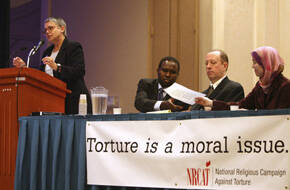Torture and Accountability
On June 23 the U.S. bishops’ Office of International Justice and Peace, in conjunction with the National Religious Campaign Against Torture, issued a 37-page study guide, Torture Is a Moral Issue, to help the faithful better understand Catholic teaching on torture (available online at www.usccb.org/sdwp/stoptorture). The study guide includes personal testimony from torture survivors, challenges its readers to become “people of the Beatitudes” and identifies several consciousness-raising actions that will help build a world in which “torture will simply become a reality of the past.”
Yet in some respects, the study guide falls short. Torture Is a Moral Issue fails to identify waterboarding as torture, and likewise, fails to acknowledge the C.I.A.’s admitted use of waterboarding against three terror suspects—Khalid Sheikh Mohammed, Abu Zubaydah and Abd al-Rahim al-Nashiri—following the 9/11 attacks. The study guide identifies its “primary, immediate concern” as the “possible use of torture by the U.S. government.” But today we know that U.S. government officials years ago moved beyond the realm of mere debate and possibility; that torture is permissible became an operative, if never acknowledged, official policy.
The study guide also makes no suggestion that those who have engaged in or approved of torture should be held accountable for their criminal actions. This is excluded from the study guide’s vision of justice. Human Rights Watch, for one, has called for an immediate criminal investigation, since “waterboarding is torture, and torture is a crime.”
Again?
It is more than a little disheartening to read the words “levee” and “deteriorating” in the news accounts of the floods that have ravaged Iowa and surrounding states. Yet here we are again, three years after Hurricane Katrina, reading about damaged infrastructure along the upper Mississippi Valley that was just not strong enough to withstand the rising waters. In all, over 20 levees failed, and roughly 36,000 people have been evacuated from their homes.
In the wake of the floods came stories of neighbors banding together, heaping sandbag upon sandbag to protect their threatened communities. These stories may inspire us, but they should not distract us from a pressing set of questions. Why did so many levees fail, and why were they not attended to sooner? What is the condition of the rest of the country’s flood protection systems? These questions are not of merely local concern. The U.S. corn and soybean crops are a matter of global importance during a world food crisis, and a significant portion of those crops are raised in Iowa.
What will it take to draw more attention to the deterioration of the nation’s highways, bridges and waterways? The next president should acknowledge the urgency of this issue, perhaps by creating a cabinet-level post devoted to improving the nation’s infrastructure. Bridges and roads have no natural constituency, so an advocate is needed. Maintenance is a job that government can do well, as proven by reports that levees built with public funds proved more resilient than privately financed ones. Fixing cracks and potholes may not lend itself to soaring rhetoric, but then again the work of government is for the most part a decidedly prosaic pursuit.
Committed and Tolerant
“We have just enough religion to make us hate, but not enough to make us love one another.” These words of Jonathan Swift seem not to apply in the United States. The U.S. Religious Landscape Survey, recently released by the Pew Forum on Religion and Public Life, reports that 79 percent of Catholics agree “that many religions can lead to eternal life.”
Does this represent a watering down of the centrality of Christ and the church? Is there a danger in this attitude? Only if it leads to total relativism or indifferentism. But that need not be the case. Might this more positive attitude to other traditions be an indication that Catholics are in tune with the Second Vatican Council? There we read that “those who, through no fault of their own, do not know the Gospel of Christ or his Church, but who nevertheless seek God with a sincere heart, and, moved by grace, try in their actions to do his will as they know it through the dictates of their conscience—those too may achieve eternal salvation” (“Dogmatic Constitution on the Church,” No. 16). Indeed, even atheists can be saved, for “the Holy Spirit offers to all the possibility of being made partners, in a way known to God, in the paschal mystery” (“Pastoral Constitution on the Church in the Modern World,” No. 22).
Rather than seeing tolerance as a lessening of the importance of Jesus Christ and the church, might we not see it as evidence of insight into the boundless love of God made manifest in Jesus Christ? Is it not an indication that Catholics in the United States appreciate the title and message of the first encyclical of Pope Benedict, God Is Love?








